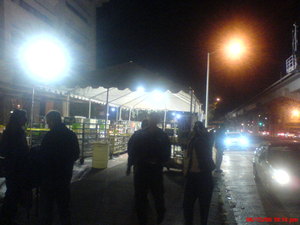tecznotes
Michal Migurski's notebook, listening post, and soapbox. Subscribe to ![]() this blog.
Check out the rest of my site as well.
this blog.
Check out the rest of my site as well.
Apr 16, 2008 6:05pm
money
Jan Chipchase, on "Sente":
Sente is the informal practices of sending and receiving money that leverages public phone kiosks and trusted networks. In Uganda the word Sente has two meanings the first being 'money' and the second 'the sending of money as airtime'. It works like this:
Joe lives in Kampala and wants to send his sister Vicky 10,000 Ugandan Shillings - about 4 Euros. He buys a pre-paid top up card for that amount but instead of topping up his own phone calls the local phone kiosk operator in Vicky's village. The phone kiosk operator uses the credit to top up his own phone, takes a commission of anywhere between 10 and 30% and passes the rest onto Vicky in cash. The kiosk operator then resells the airtime at a profit (it is after all his business).
I love the idea that this currency has a value ceiling, an upper bound defined by the number of people with minutes in the day to talk to one another.
Jack Rusher, on money:
The early Mesopotamians used a weight of barley as their first currency. It seems important to point out to the modern reader, accustomed as she must be to the way modern currency works, that this money was different from the money of today in some very important ways. It was an actual edible commodity that could be used to make soup, bread and beer, for one thing, and for another, it was prone to decay: pests ate it, it tended to rancidity if kept for too long, and so on.
This latter property of the currency was shared with most goods in the economy, all of which fell somewhere along a continuum of impermanence. The impermanent nature of these goods is linked to the underlying ecosystem from which all value ultimately arises; everything that wasn't made of sand (pottery) or metal (tools and jewelry) was the direct product of sunlight and bio-mass, and consequently subject to unavoidable near-term wear and decay.
...
In a very real sense modern economics is still suffering the effects of a 5,000 year old swindle. The modern wisdom that a small rate of inflation is part of a healthy economy comes down to the need to make our silver behave a little more like barley.
There's an upper bound here, as well, defined by how much actual barley can be consumed.
Adam, on twitter:
If I were to design a universal currency that didn't float too badly, I'd base it on avg'd cost of balanced 2000 kCal diet in 200+ markets.
How hard could it be to design a simple currency with these characteristics and set it loose? Second Life has one; seems like all that's needed is an acceptable amount of trust and an exchange rate. Great conversation with Adam exploring this earlier today.
Instead of a gold standard, it would operate on a food bank standard where you traded your tokens in for a single balanced meal when you weren't trading them for goods and services. This also reminds me of petrodollars, another concept connected to the ultimate foundation of value: fueling biological and other activity for the purposes of movement and procreation.
Here's the scene at the 7th street post office when I dropped off my taxes last night at 10pm:

Comments (3)
mike, excellent post. i've been thinking a lot about money recently and just how tenuous our economy actually is. in the past, i've been convinced that our dollar should be tied to something of intrinsic value, like gold. but i like this idea of a global currency based on food (though I would argue against the formulation of the 2000 kCal number). it is interesting to consider whether any human invention (financial markets included) can obtain a long term, not to mention socially just, balance. one of the current hypotheses which is about to be disproved is that markets can forever increase in value. what goes up, must come down. brandon
Posted by brandon brown on Thursday, April 17 2008 4:29pm UTC
The first place my mind went with this is the old "Give a man a fish... teach a man to fish..." proverb. Of course, you're actually talking about a currency representing a (literal) perishable basket of goods. Compound interest would still be in play, meaning this new "food standard" for currency would require ever increasing supplies of food (nevermind the population) to be available as backing. Which comes back to the perishable nature of the currency and likely the reason it was abandoned in the first place.
Posted by Richard Crowley on Friday, April 18 2008 2:49am UTC
Richard that's really interesting - if the currency is pegged to a particular thing of value, does the lack of inflation encourage hoarding? Brandon, e-mail me. =D
Posted by Michal Migurski on Saturday, April 19 2008 12:02am UTC
Sorry, no new comments on old posts.